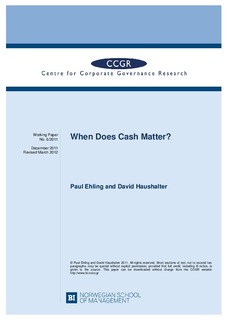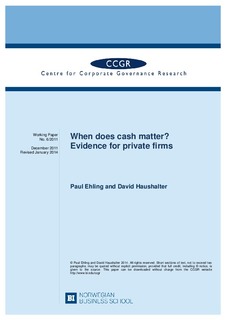| dc.contributor.author | Ehling, Paul | |
| dc.contributor.author | Haushalter, David | |
| dc.date.accessioned | 2012-09-03T10:59:54Z | |
| dc.date.available | 2012-09-03T10:59:54Z | |
| dc.date.issued | 2011 | |
| dc.identifier.uri | http://hdl.handle.net/11250/95412 | |
| dc.description.abstract | We examine the association between a firm’s cash holdings and its performance. Using a
large sample of private companies, we find that the importance of cash for a firm’s
performance varies substantially with its size and the conditions it faces. When there are
negative shocks to industry or macroeconomic conditions, there is a positive association
between cash holdings and performance for small firms. This association is much weaker
for large firms. There is no association between cash holdings and performance for other
types of conditions, regardless of the firm’s size. Consistent with the benefits from cash
holdings depending on a firm’s ability – and willingness – to use external financing,
small firms borrow less than large firms during negative shocks. | no_NO |
| dc.language.iso | eng | no_NO |
| dc.publisher | BI Norwegian Business School | no_NO |
| dc.relation.ispartofseries | CCGR Working Paper;6/2011 | |
| dc.title | When Does Cash Matter? | no_NO |
| dc.type | Working paper | no_NO |
| dc.source.pagenumber | 52 pages | no_NO |

